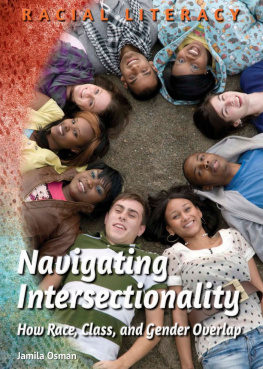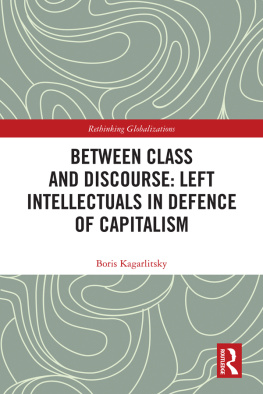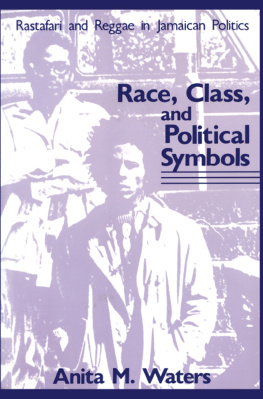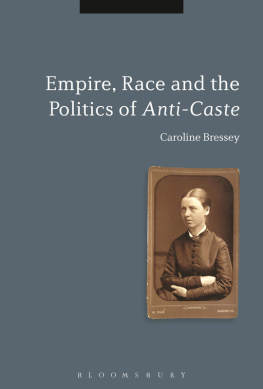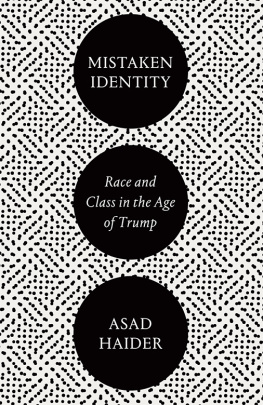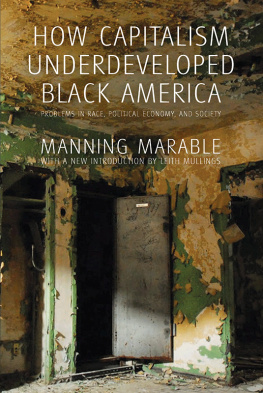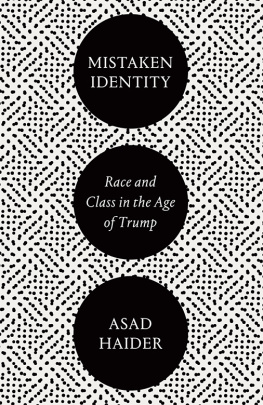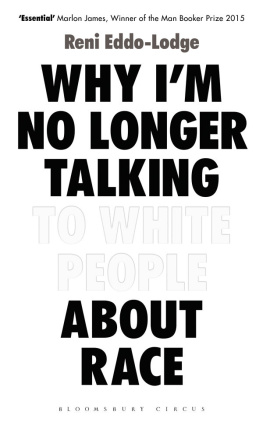Natives
Race and Class in the Ruins of Empire
Akala

www.tworoadsbooks.com
First published in Great Britain in 2018 by Two Roads
An imprint of John Murray Press
An Hachette UK company
Copyright Kingslee Daley 2018
The right of Akala to be identified as the Author of the
Work has been asserted by him in accordance with
the Copyright, Designs and Patents Act 1988.
All rights reserved. No part of this publication may be reproduced,
stored in a retrieval system, or transmitted, in any form or by any
means without the prior written permission of the publisher, nor be
otherwise circulated in any form of binding or cover other than that
in which it is published and without a similar condition being
imposed on the subsequent purchaser.
A CIP catalogue record for this title is available from the British Library
ISBN 978 1 473 66124 0
Hodder & Stoughton Ltd
Carmelite House
50 Victoria Embankment
London EC4Y 0DZ
www.tworoadsbooks.com
www.hodder.co.uk
To Uncle Offs
Contents
Born in the 1980s
I was born in the 1980s and I grew up in the clichd, single-parent working-class family. We often depended on state benefits, we lived in a council house, I ate free school meals. I am the child of a British-Caribbean father and a Scottish/English mother, my teenage parents were never married and they separated before I was born. My dad spent a portion of his childhood in and out of the care system and my mum was pretty much disowned by her father for getting with a nig nog. The first time I saw someone being stabbed I was twelve, maybe thirteen, the same year I was searched by the police for the first time. I first smoked weed when I was nine and many of my uncles meaning biological uncles as well as family friends went to prison. My upbringing was, on the face of it, typical of those of my peers who ended up meeting an early death or have spent much of their adult lives in and out of prison.
I was born in Crawley, West Sussex, but moved to Camden in north-west London before I had formed any concrete memories and I spent my childhood and teenage years living there. Camden is home to 130 languages and about as wide a divide between rich and poor as anywhere in the country. I went to school with the children of lords and ladies, millionaires, refugees, children clearly suffering from malnourishment and young boys selling drugs for their fathers. If there is anywhere in Britain that could serve as a petri dish for examining race, class and culture, Camden would be that place.
I was born in the 1980s in the mother country of the British Commonwealth, the seat of the first truly global empire, the birthplace of the industrial revolution and the epicentre of global finance. What does this mean? What are the social and historical forces that even allowed my parents to meet? My father is the British-born child of two African-Jamaican migrant workers who came to the mother country as part of the Windrush generation. My mother was an army child, born in Germany, spending her infant years in Hong Kong and moving to the small town in which I was born in her early teens. In my parents meeting are untold histories of imperial conquest, macroeconomic change, slave revolts, decolonisation and workers struggles. I was born poor, by Western standards at least. I was born poor and racialised as black despite my white mother in perhaps the most tumultuous decade of Britains domestic racial history.
I was born in the 1980s, before mixed-race children had become an acceptable fashion accessory. A nurse in the hospital promised to give my white mother nigger blood when she needed a transfusion after giving birth; yeah, the 1980s was a decade bereft of political correctness.
The 1980s was also the decade of ThatcheriteReaganite ascendency. The golden age of capitalism had ended in 1973, and the 80s saw the start of the rollback of the post-war welfare state, increased sell-off of public assets and the embrace of an individualistic self-made logic by the very generation that had become wealthy with the support of free universities and cheap council houses, and had literally been kept alive by the newly constructed National Health Service. The decade saw the most powerful military machine ever assembled spun into existential crisis by the enormous threat posed by the potential of a socialist revolution on the tiny little Caribbean island of Grenada, and the self-appointed captains of global democracy could be found backing genocidal regimes from Nicaragua to South Africa though that couldve been any decade, really. It was the decade Thomas Sankara was killed, the Berlin Wall fell, Michael Jackson started to turn white and the MOVE movement was bombed from the sky. The 1980s were fairly eventful, to say the least.
For black Britain, the decade began with the New Cross fire/massacre of 1981, a suspected racist arson attack at 439 New Cross Road, where Yvonne Ruddock was celebrating her sixteenth birthday party. The prime minister did not even bother to offer condolences to what were apparently British children and their families. Of course, Thatcher could not, in her heart of hearts, express sympathy for black British children while supporting an apartheid government rooted in the idea that black people were subhuman, so at least she was consistent. There certainly was not going to be a minutes silence and most of Britain is completely unaware it even happened, despite the New Cross fire being one of the largest single losses of life in post-war Britain.
The same year also saw the passing of the British Nationality Act, the last of a series of Acts that were passed from 1962 onwards and whose racialised motivations were barely disguised. British Caribbeans had come to learn that they were indeed second-class citizens as many had long suspected but they were not of a mood to be quiet and keep their heads down about it. New Cross led to the largest demonstration by black people in British history; 20,000 marched on parliament on a working weekday and foretold of the harsh realities of the decade to come: Blood a go run, if justice na come was the chant. It was to prove prophetic.
The rest of the decade of my birth was punctuated by uprisings and disturbances in almost all of the Caribbean and Asian areas of the country, as well as the miners strikes of 198485 and the constant presence of the anti-apartheid struggle. These disturbances included the infamous Brixton riots of 1981, set off by the sus laws a resurrection of the 1824 Vagrancy Act, these laws allowed people to be arrested on the mere suspicion that they intended to commit a crime and their manifestation in Swamp81, a racialised mass stop-and-search police campaign.
Brixton burned again in 1985, set aflame by the police shooting and paralysing Cherry Groce. Just a week later, the death of Cynthia Jarret after a police raid on her home sparked the Broadwater Farm riots, where a police officer was killed. I know members of both families personally, and grew up with the son of Smiley Culture, the reggae artist who died during a police raid on his home in 2011. I mention these connections only to point out that these people are not abstractions or mere news items, but members of a community, our community. Dalian Atkinson, the former Premier League footballer, was tasered to death by the police in 2016; its hard to imagine a former pop star or a retired footballer from any other community in Britain dying after contact with the police.
These 1980s reactions to state violence, racism, poverty and class conflict were by no means limited to London; there was the St Pauls riot in Bristol in 1980, Moss Side and Toxteth in the north-west of England in 1981, Handsworth in the Midlands in 1981 and 1985 and Chapletown in Leeds in 1981 and 1987. How many millions of pounds of damage these outpourings of rage caused I dont know, but now that they are sufficiently distant from the present, very few academics would dispute that they had very real socio-political causes. Indeed, entire books have been written on them, and government policy and police behaviour and training were reformed in direct response to these events, though what lessons the British state has truly learned from the 1980s remains to be seen.
Next page

